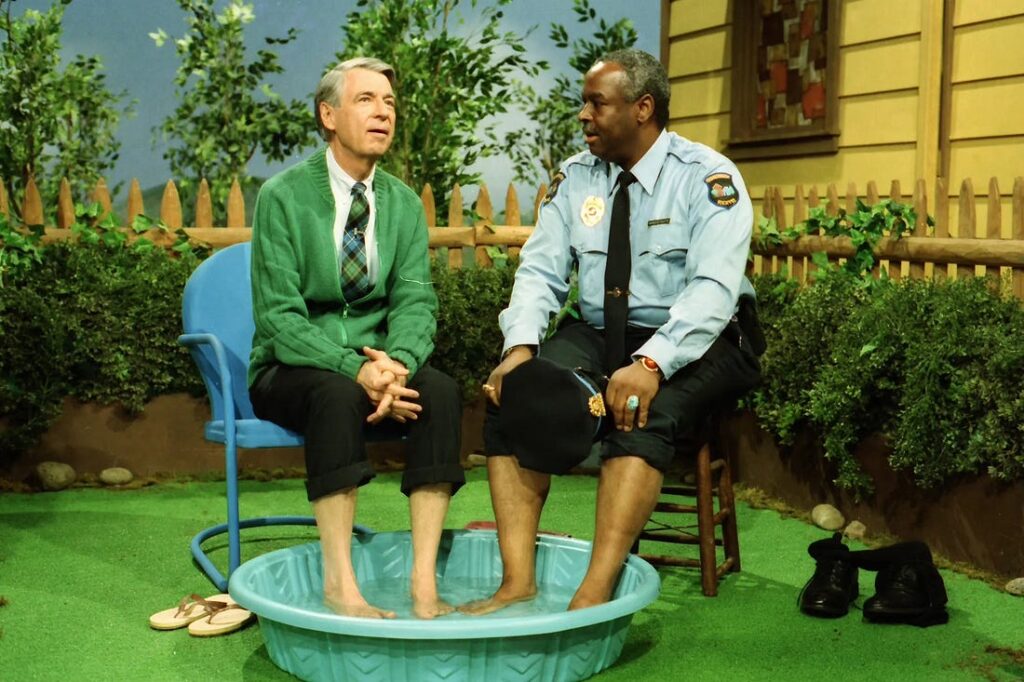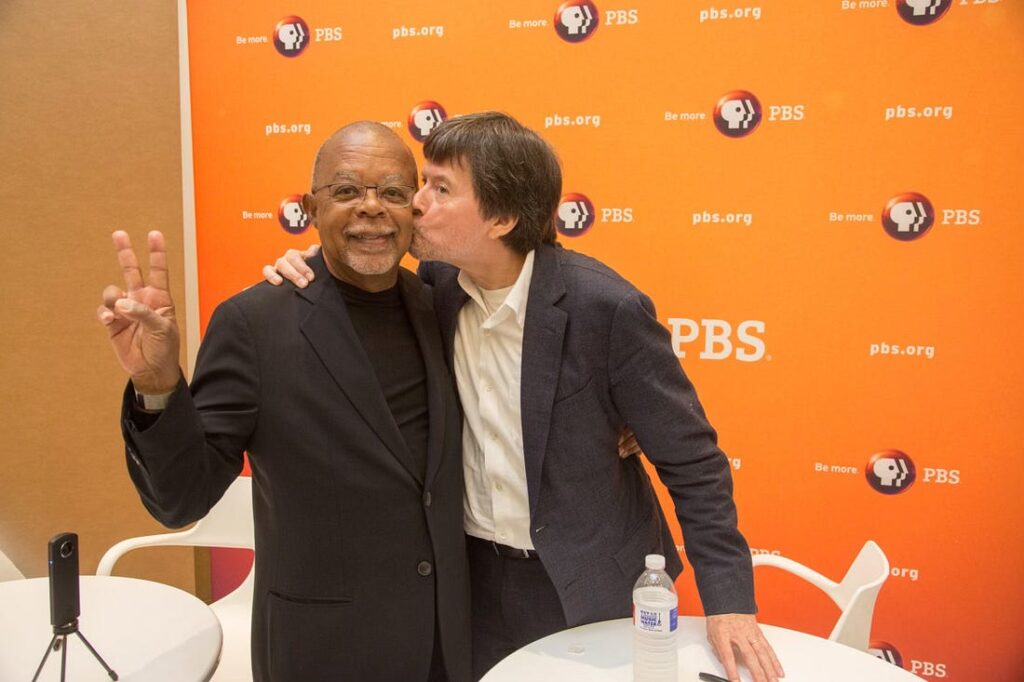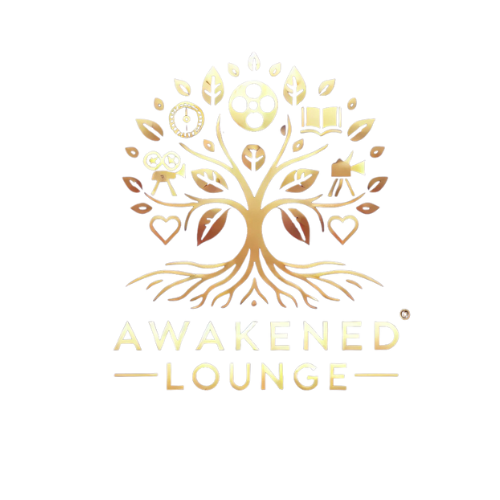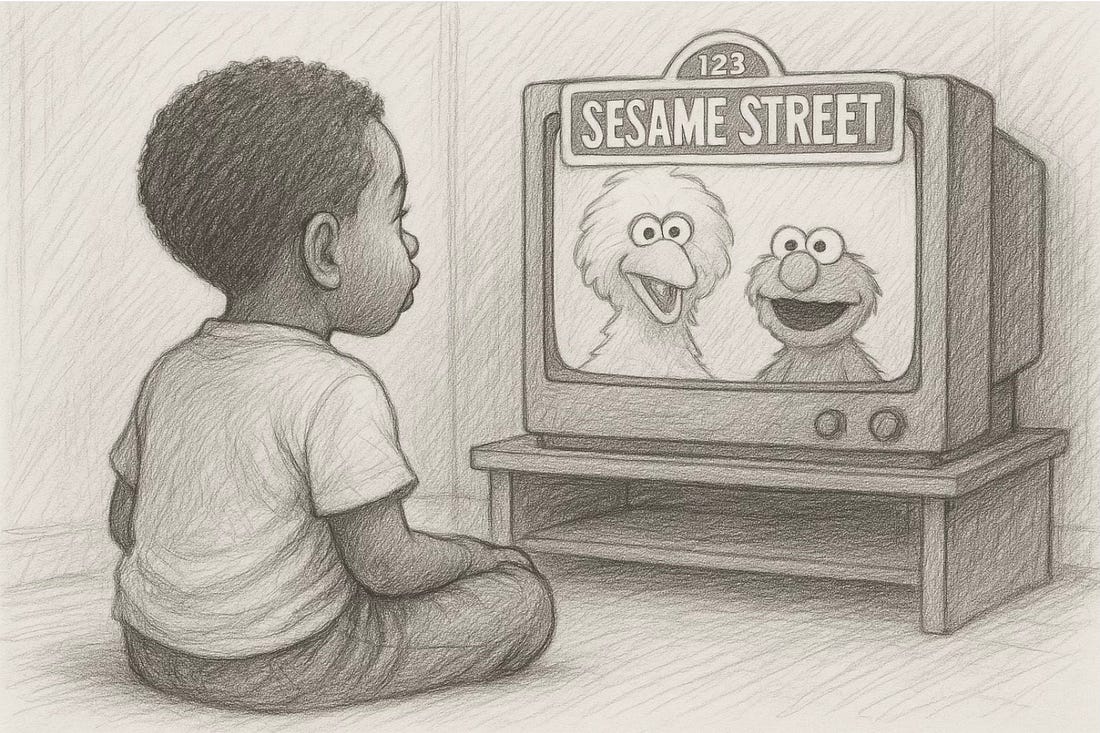On Truth, Our Collective Memory, and the Potential Loss of PBS
When I was small, in those hazy, delicate years before I learned to fear the world, I spent many afternoons on my grandmother’s floor, holding tightly to the golden feathers of a stuffed Big Bird. The television hummed gently in the background, its screen flickering softly with scenes from Sesame Street—children of all shades playing beneath a patient sun, numbers and letters dancing to rhythms of effortless optimism. Big Bird, Elmo, and Oscar felt not like puppets but like family, gentle guides helping a small boy navigate the murky terrain of growing up Black in America.
It was a brief moment each day where the universe offered itself openly—no hidden agendas, no sinister whispers, only the comforting promise that knowledge, truth, and kindness could be found simply by tuning in. All thanks to PBS.
What sort of child would I have been—no—what sort of man would I be, if not for memories such as these? If not for Mister Rogers’ Neighborhood, Reading Rainbow, Arthur, Frontline, and so much more. That’s exactly what the Trump administration is trying to find out.
Recently, Donald Trump announced executive orders to defund PBS, declaring it an enemy to American values, a hotbed of so-called “radical propaganda.” This attack is not passive nor accidental. The attempted defunding of PBS represents more than political theater. It signals a strategic move to strip entire generations of the analytical tools necessary to question, challenge, and comprehend the structures governing their lives. To erase PBS is to dismantle an essential public forum, one not owned or shaped by corporate or political interests. It deprives our children, especially those whose schools and communities lack resources, of the foundational understanding of history, science, and empathy necessary to navigate and transform society.
Trump’s executive order, cloaked deceptively in the language of patriotism (per usual), is a calculated assault on the American mind. Because I believe, Republicans, more than anyone, understand that a mind equipped with truth and history is dangerous to power—especially power that thrives on misinformation, ignorance, and division. Hence the war on “Critical Race Theory,” book bans, etc.
Without the gentle insistence of PBS’s measured voice, generations risk inheriting not just gaps in knowledge but hollowed-out minds, susceptible to manipulation by louder, bigoted voices.

When I consider PBS, I think less of television as entertainment and more as a quiet battlefield—one where America grapples endlessly, painfully, with itself. Here is a channel that, in its simplest form, stands as a quiet guardian of truth and memory. It is a space in which our collective histories—the bright and the bitter alike—are not commodified but preserved. Through meticulous storytelling, PBS has illuminated the jagged edges of the American narrative: the searing clarity of Ken Burns exploring the legacy of enslavement and Jim Crow, the humble honesty of Frontline dissecting injustice and corruption, and the hopeful dignity of children’s programming reminding us that learning can be joyous, free of hidden agendas.
PBS is more than a broadcaster; it is the steady pulse beneath the surface, quietly pushing back against America’s historical tendency to stay asleep. The strength of PBS lies precisely in its subtlety—in its refusal to shout above the noise, to join the clamorous race for ratings or spectacle. In a nation that routinely forgets the faces it has scarred, PBS serves as an archive, holding gently the stories of lives ignored, denied, or erased entirely from other channels. And so, to attack PBS is to attack a deeper consciousness—a shared memory of America’s full and complicated truths.
In our increasingly fragmented media landscape, PBS is a quiet anomaly. A place where the embattled notion of trust still clings stubbornly, defiantly, against the tides of cynicism. America’s institutions have rarely earned the trust they demand, their histories marred by broken promises, entrenched inequities, bigoted algorithms, and betrayed ideals. But PBS, almost by miracle or accident, managed to hold a line against these storms, refusing to sell itself for profit, refusing to yield fully to agendas dictated by power or capital. And in that refusal, it has quietly earned trust, one viewer, one child, one community at a time.
In that way, PBS also exists as a counterpoint to the condition of perpetual skepticism that plagues our society. It does not raise its voice to drown out the noise, nor does it engage in flashy spectacles that distract from deeper honesty. Rather, PBS quietly insists on trustworthiness through consistency and care, a rare insistence that promises nothing except the patient, relentless pursuit of truth.
This quiet insistence manifests most clearly in PBS’s storytelling. The careful, painstaking work of illuminating America’s collective history, warts and all. Ken Burns’s Jazz, for example, is not merely a history of music, but a history of Black genius birthed under the immense pressure of American racism. It tells the story of improvisation as survival, creativity as defiance, jazz itself as a cry and a call to acknowledgment. Burns’s documentary on the Civil War refuses sanitized myths of noble generals and valorous death, forcing viewers instead to reckon with the brutality of a nation tearing itself apart over the rights of Black bodies, and to ask, even quietly, how much has truly changed. Likewise, his exploration of Vietnam forces a confrontation—not only with the war itself but with the stubborn American tradition of self-deception, of burying uncomfortable truths beneath layers of patriotic nostalgia.

In classrooms and living rooms, in rural towns and urban apartments, PBS programs such as Nova and American Experience continue this legacy, patiently undoing ignorance and misinformation. They speak plainly, inviting all who tune in to learn about the natural world, about science, about the complexity inherent in American lives. Through this, PBS grants all Americans, irrespective of class or geography, access to the shared history that shapes us. It democratizes knowledge, strips it of exclusivity, and places it within reach of everyone willing to seek truth—no subscriptions, no paywalls, no hidden costs.
This, perhaps, is the ultimate threat PBS poses to power. By freely offering truth, by insisting on accessible knowledge, it quietly dismantles the barriers ignorance constructs to protect privilege.
This is why Donald Trump wants to destroy the station. Because PBS embodies a simple but profoundly radical idea: that every American, rich or poor, urban or rural, Black or white, deserves equal access to information, knowledge, and history. PBS holds within it an implicit challenge to an old American order built on strategic ignorance—an order designed to sustain and expand white supremacy, classism, and all the sins of our world.
Trump’s attack on PBS must be understood for what it truly is. A deliberate tactic in a broader strategy aimed at maintaining and further entrenching social hierarchies. PBS, with its commitment to storytelling that is less filtered by corporate or political agendas, poses a direct threat to those who rely on ignorance and misinformation to wield and consolidate power. For if the American people—particularly those who have long been kept in carefully engineered states of ignorance—truly grapple with the fullness of their history, the myths upon which America is built would quickly begin to collapse.
To dismantle PBS is thus to clear the stage for ideologies that thrive on historical distortion, selective memory, and outright lies. This, of course, is textbook fascism. It mirrors precisely the control of information and the silencing of liberating ideas pursued by fascist regimes of the past, such as Adolf Hitler’s Germany. Fascism requires, above all else, a citizenry stripped of consciousness, unable to see clearly what shapes their present. It needs a people easily swayed by spectacle, vulnerable to the seductive power of fear and the persuasive simplicity of scapegoating.
In Nazi Germany, the regime did not simply burn books; it sought to erase entire systems of thought, entire frameworks of truth, all in service of an ideology rooted deeply in white supremacy and violent nationalism. Similarly, Trump’s war against PBS and his broader campaign against truth—his systematic assaults on journalism, his attacks on historians and educators, reflects the same impulses. Calculated efforts to silence narratives that empower marginalized communities, narratives that threaten the false comfort of white dominance, narratives that disrupt the neat myths used to justify oppression and exploitation.
This is why we need PBS. Not merely for nostalgia or sentimental comfort, but because America’s soul is held gently within the hands of storytellers. PBS is the quiet architect of possibility, where truths are seeded, watered by careful reflection, and left to blossom slowly in the imaginations of children and adults who grow into thinkers, creators, and fighters for justice. Without PBS, America becomes a room without windows—a place where fear grows louder, ignorance continues to be the only currency, and truth, that most endangered thing, withers away.
If we lose PBS, we lose a place where dreams are not commodified, where history is never a market calculation. We lose the spirit of a country that might yet learn from its scars. To silence PBS is to silence the gentle questions that challenge our harshest assumptions, to extinguish a quiet flame holding back the America’s darkest impulses.
We lost a boy clutching a big bird stuffed animal while watching Sesame Street, who one day becomes a writer.
So here we stand, watching the light dim, forced to ask ourselves what becomes of a nation that completely forgets how to listen softly, that chooses noise over nuance. If we allow this loss, what remains of our fragile, fractured democracy? Because it was PBS that taught so many of us that the revolution is a resistance that begins in whispered truths, patiently offered, waiting for someone brave enough to listen.
Here you can contact lawmakers to urge them to save public media: https://protectmypublicmedia.org/rsc-emails/




